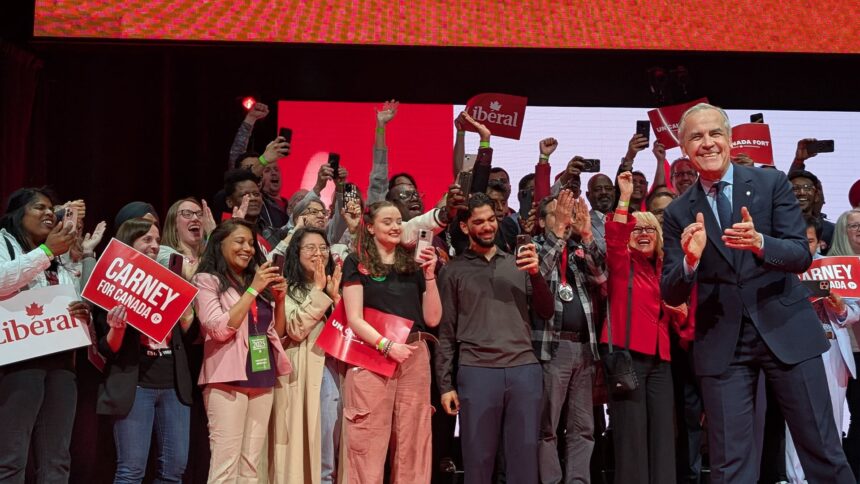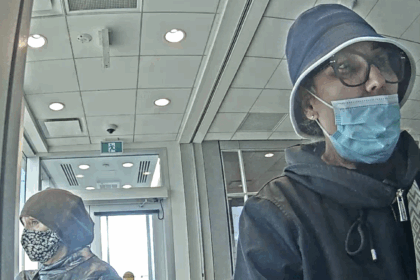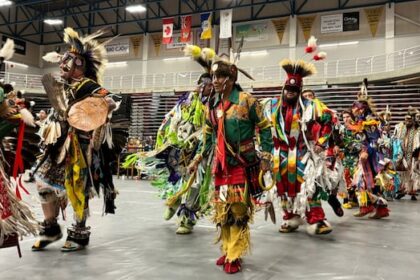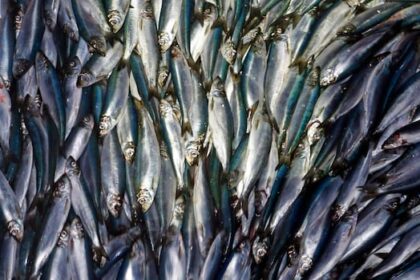Of the 45 Indigenous candidates spent the past month knocking on doors and shaking hands – now after the votes have been counted – 12 will head to Ottawa to be officially sworn in as members of Parliament. The candidates were running in 35 electoral districts from coast to coast to coast. Jaime Battiste was the first to be re-elected Monday night in the riding of Cape Breton-Canso-Antigonish in Nova Scotia – a riding where boundaries have been redrawn. “I’m very proud to continue to be one of the only First Nations in the House of Commons who lives in the First Nations reserve,” he told APTN News on election night. “That means I can continue to advocate for those people who live on the reserve. “I’ll be there to continue to work hard for not just my riding, but Indigenous people all across Canada.” Leah Gazan was in tough in her riding of Winnipeg-Centre but she beat the Liberal challenger by 1,416 votes. “People told me this was going to be a tough campaign, but you know, we’re a special community, and community came out for me in droves, and I’m so touched,” she said. NDP MP Leah Gazan speaks with reporters after her victory in Winnipeg Centre. Photo: Jared Delorme/APTN. But it was a tough night for the NDP overall. The party lost “party status” in the House of Commons because it failed to win 12 seats. This means the party will have substantially reduced funding to perform its caucus duties. Métis NDP MP Blake Desjarlais lost his Edmonton seat – so did NDP Leader Jagmeet Singh – who also resigned as head of the party. “I’m only focused on tonight,” Gazan said. “Certainly, we have to take some time and reflect on how we need to rebuild as a party. My focus has always been Winnipeg Centre, the beautiful people in my community.” Long-time NDP MP Niki Ashton was also sent packing by the electorate in the Manitoba riding of Churchill-Keewatinook Aski. She lost to Liberal Rebecca Chartrand by about 3,000 votes. “We need major bridge building in this riding because we need to ensure that this riding is a centre piece as we start re-envisioning the Canadian economy,” Chartrand told party faithful. “And we’re going to do it right here in Churchill-Keewatinook Aski because the people have spoken.” Liberal Rebecca Chartrand speaking in her riding on election night. pic.twitter.com/gxHLJCPMCj — APTN News (@APTNNews) April 29, 2025 On a positive note for the NDP, Inuk MP Lori Idlout held onto the riding of Nunavut. Idlout finished the election with 2,945 votes while the Liberal candidate Kilikvak Kabloona followed close behind 2,868. In a conversation with APTN during the campaign, Idlout said, if re-elected, she would work to resolve the housing crisis in Nunavut and help fortify Arctic sovereignty by improving marine infrastructure and airports. She told media on Tuesday she isn’t considering a run at the leadership of the NDP. Liberal Mandy Gull-Masty is now the MP for Nunavik-Baie-James-Eeyou in Quebec after beating out the Bloc Quebecois candidate. Gull-Masty is the former grand chief of the Crees of Eeyou Istchee. Conservative Billy Morin won his riding of Edmonton-Northwest but could not be reached for comment. Another Conservative candidate, Ellis Ross, won his riding of Skeena-Buckley Valley in British Columbia. Métis MP Adam Chambers won his seat in the riding of Simcoe-North in Ontario for the Conservatives. Two long time MPs, touted as Indigenous candidates for the Liberals, Vance Badaway and Marc Serre were defeated in their Ontario ridings. Liberal Buckley Belanger won the Saskatchewan riding of Desnethé-Missinippi-Churchill River by 3,500 votes. The riding was held by the critic for Indigenous affairs Gary Vidal who chose not to run again. “It’s a huge piece of land. There’s so much wealth on that piece of land, and what we’re trying to do is make sure we connect the issues and challenges of our community to the wealth of that land so we can forge a better path forward for our children and grandchildren,” he said. Read More: Decision 2025 At the time of publishing, Métis Conservative MP Marc Dalton is holding his riding in Meadows-Maple Ridge in British Columbia. In Quebec, Simon-Pierre Savard-Tremblay delivered the riding of Saint-Hyacinthe-Bagot-Act for the Bloc Quebecois. Wade Grant won the Musqueam riding for the Liberals. According to Elections Canada, more than 67 per cent of eligible voters cast ballots. While 45 Indigenous candidates put their names forward to run – that’s fewer than the 77 candidates who ran in 2021 winning 12 seats. Yukon and Northwest Territories Liberal MP Brendan Hanley addressing a crowd gathered at his election night watch party. Photo: Facebook. In the Yukon, Liberal incumbent candidate Brendan Hanley won his seat a second time. “I am so proud to be part of a re-elected Liberal government,” he told those gathered at his election watch party on Monday night. “I’m glad and grateful to have earned a passing grade after having served over the last three-and-a-half years. This is not and will never be an honor that I take lightly,” he added. Hanley earned 52.8 per cent of the vote for the Yukon riding, totaling 11,687 votes. Conservative candidate Ryan Leef, who served as MP from 2011 to 2015, came in second with 38.7 per cent of the vote, totaling 8,573 votes. Political newcomers Katherine McCallum for the NDP and Gabrielle Dupont came in third and fourth place, respectively. McCallum received 6.4 per cent of the vote, totaling 1439 votes, while Dupont took home 2.1 per cent, totaling 474 votes. Prior to entering politics, Hanley was perhaps best known as the territory’s chief medical officer of health where he helped guide the territory through the COVID-19 pandemic. He took a leave of absence to run for the Liberals in 2021. In the Northwest Territories, Rebecca Alty kept the riding in Liberal hands by beating Conservative Kimberly Fairman by more than 3,000 votes. Elections Canada has nearly wrapped up counting all ballots in what turned out to be a razor-close race that will leave the Liberals three seats short of a majority government. The Liberals are projected to win 169 ridings. The Conservatives trail with 144 seats and will form the official opposition, while the Bloc Québécois won 22 seats, the NDP won 7 and the Green Party was elected in one riding. Recounts in some ridings are expected. The Liberals are set to return to the House of Commons for a rare fourth consecutive mandate. Losing party status Singh address party faithful and resigns on election night. Photo: Tina House/APTN. Paul Thomas, a professor emeritus of political studies at the University of Manitoba says losing party status comes with significant setbacks. “Being an official party in the House of Commons brings you opportunities in terms of procedures, time in question period. It brings you places on the committee system that operates in the House of Commons, studying bills, studying policy areas and so on,” he said. Gazan, for example, has advanced several Indigenous commitments at a federal level including the Red Dress Alert pilot program and a private members’ bill to criminalize residential school denialism. But Thomas said the loss of party status and seats could hinder the NDP’s ability to advance Indigenous issues. “They had a working partnership with the Liberals, and whatever else you might say about Justin Trudeau, he was identified with the Indigenous reconciliation file,” Thomas said. “He did make some progress on that file and part of that presumably came because of pressure from his partner in the coalition, the informal coalition.” Congratulations from Indigenous organizations Several organizations issued statements on Carney’s win. Alvin Fiddler, grand chief of Nishnawbe Aski Nation (NAN) said he “looks to his government to honour and uphold our Treaties and advance the priorities of NAN First Nations.” NAN territory is rich in much sought-after minerals but Fiddler warned that the government needs to respect Aboriginal and inherent rights. “Economic concerns were front-and-centre during this election, and there has been a lot of talk about increasing access to NAN territory for minerals and other resources. Our Nations are not against development, but the Canadian economy cannot be strengthened without engaging First Nations as true partners,” Fiddler said in the statement. “Our Nations will not tolerate unwanted intrusions into their territories. They are looking to this new government to acknowledge their stewardship over their traditional territories and support their rightful authority and jurisdiction over their homelands.” The First Nations Leadership Council said chiefs are ready to work with Carney “on recognition of First Nations’ inherent title and rights and advancing justice and equity broadly, as well as the climate emergency.” “Only months after the federal Conservatives were dangerously poised to win by a landslide, I am greatly relieved that Pierre Poilievre, with his message of division and obsessive focus on accelerated resource exploitation, has not won,” said Stewart Phillip. “We are ready to meet with Prime Minister Mark Carney as soon as possible to discuss our mutual priorities and chart a path forward.” ITK congratulates Prime Minister Mark Carney & his government on their election win. We’re eager to work with you to advance Arctic sovereignty, security & defence for the benefit of Inuit & all Canadians. Thank you to all candidates who ran. Let’s get to work. pic.twitter.com/hUxpuhC1ja — ITK (@ITK_CanadaInuit) April 29, 2025 The Inuit Tapiriit Kanatami send out a message on social media. “ITK congratulates Prime Minister Mark Carney & his government on their election win. We’re eager to work with you to advance Arctic sovereignty, security & defence for the benefit of Inuit & all Canadians. Thank you to all candidates who ran. Let’s get to work,” the social media post said. The Assembly of First Nations (AFN), which held a series of online forums with each of the party leaders, said the federal government must work to implement the United Nations Declaration on the Rights of Indigenous Peoples, the Truth and Reconciliation Commission’s calls for action and the importance of “economic reconciliation.” “What we heard from Prime Minister Carney was a commitment to fully and meaningfully advance First Nations priorities by immediately introducing legislation on the right to clean drinking water, fully implementing the UN Declaration, and reforming child and family services,” said the statement from National Chief Cindy Woodhouse Nepinak. “We look forward to meeting with Prime Minister Carney immediately to discuss how we can move forward together with these commitments.” Continue Reading
Indigenous candidates in the federal election: Who is going to Ottawa?

Leave a Comment










